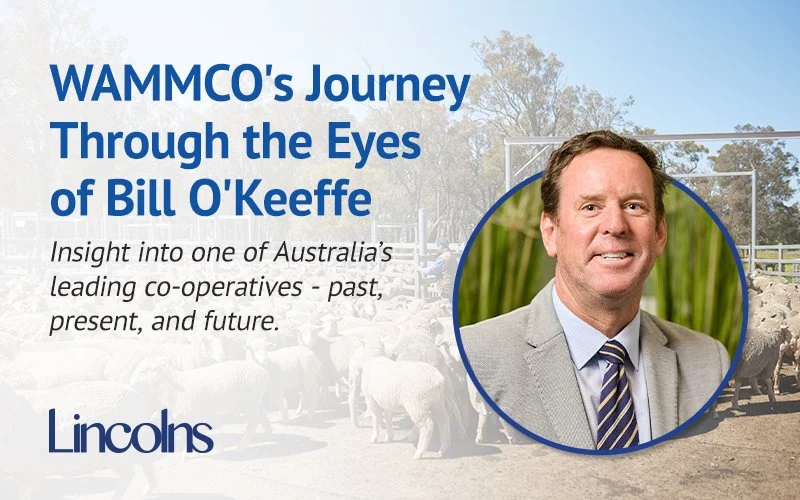A Voice from the Field: Bill O'Keeffe on WAMMCO's Past, Present and Future
By Thomas Warner and Kym Arnold
August 2025
For the final article in our co-operative interview series, we spoke with Bill O’Keeffe, Chairman of WAMMCO – the Western Australian Meat Marketing Co-operative. Having served on the board since 2018 and recently appointed Chairman in 2024, Bill shared thoughtful insights into how WAMMCO has grown, how it supports its members, and why the co-operative model still holds strong in today’s global marketplace.
Before we head into the WAAMCO story, we’re excited to be launching something new in the coming months – a 1-day intensive masterclass for those interested in starting or strengthening a co-op in their region. You can read more about this at the end of this newsletter.
A Proud Producer-Owned History
WAMMCO was established in 1999 following the deregulation of Australia's lamb export industry. As government involvement in the sector wound back, the Katanning abattoir was handed over to Western Australian livestock producers. Rather than purchasing the site outright, producers were effectively gifted the facility, with the responsibility of upgrading and modernising it to meet international standards. From those early and often challenging days, WAMMCO has grown into one of Australia’s largest and most successful co-operatives, exporting premium lamb and sheepmeat to more than 60 countries.
Today, WAMMCO operates processing facilities in Katanning, WA, and Goulburn, NSW. Over time, the co-operative has worked to improve its operations by responding to the needs of producers and the requirements of the export market. Bill explains that this hasn't always been easy—developing a shared vision took time and ongoing conversations with members. "You learn a lot just by listening," he says. "Our direction has been shaped by what producers tell us they need, and what the market expects. It's still evolving."
Bill's Role and the Power of Representation
As Chairman, Bill brings the voice of the producer directly into WAMMCO’s leadership. While the role is part-time, it includes regular board meetings, community engagement, and strategic oversight. "It’s about maintaining a balance between commercial success and member benefit," he says.
Ownership, Governance, and Transparency
WAMMCO’s co-operative structure gives each member an equal vote, regardless of size. The board consists largely of elected producers, ensuring decisions are grounded in practical industry understanding. This structure helps maintain trust and keeps the organisation accountable to its members.
Member Engagement and Real-World Challenges
“We don’t just process livestock—we work with producers throughout the year," Bill notes. But keeping members engaged isn’t always easy. "People are busy, and sometimes it's hard to get them to see the value beyond the cheque they receive," he admits. That’s why WAMMCO invests in strong communication—via newsletters, field days, and carcass feedback systems—to show members how their involvement contributes to a stronger, more resilient supply chain.
The co-op also supports members with pricing options, livestock improvement programs, and benchmarking tools. "Our job is to keep adding value—whether that's better prices, better feedback, or better relationships," Bill says.
Navigating Change and Driving Growth
The co-operative has faced its share of industry volatility, including climate variability, shifting export markets, and global supply chain disruptions. One of the more pressing challenges has been the impact of live export restrictions, which Bill says has pushed some producers out of the industry altogether. "It’s tough seeing good people walk away," he says. "We’re trying to do what we can to support those who want to stay in." WAMMCO is focusing on providing education, transparent feedback, and realistic pathways to help producers remain viable within the changing system. Through steady leadership, diversification, and strategic investment, WAMMCO has worked to maintain its competitiveness while adapting to new realities.
A major part of that resilience is the expansion of its Katanning plant. "We’ve invested heavily to increase processing capacity and improve efficiency," Bill explains. "It’s not just about growth, it’s about making sure we can keep delivering for our members for the long term."
The Relevance of the Co-operative Model
"The co-operative model means the benefits stay in the hands of producers," says Bill. "It ensures transparency, accountability, and a shared sense of ownership." He acknowledges that while the model isn't perfect, it offers a practical way for producers to retain some control and influence in an industry that's becoming more corporatised.
Looking to the Future
WAMMCO is focused on the future with a commitment to innovation, sustainability, and the next generation of producers. Plans include further investments in automation, environmental initiatives, and expanding member services. Bill is especially enthusiastic about developing tools and programs that will support young producers and ensure the long-term success of the co-operative.
As we close our co-operative interview series, we want to thank everyone who shared their time and stories with us. We've really enjoyed hearing each co-op's journey—the differences in what they do, and the shared commitment they all have to supporting their members and communities. If you’d like to learn more about co-operatives or explore how this model could benefit your community or business, feel free to reach out to Tom Warner or Kym Arnold through our office.
Coming soon – 1-day Co-op masterclass and kickstart program
We know from our co-op interview series just how powerful the co-operative model can be. But getting off the ground can be challenging. That’s why we are looking to develop a 1-day intensive masterclass designed to give you the tools and confidence to take the next step.
To register your expression of interest in participating in our masterclass, please click
ATO Interest Is No Longer Tax Deductible
From 1 July 2025, interest charges from the Australian Taxation Office, known as the General Interest Charge (GIC), will no longer be tax deductible.
If your business carries tax debt or has overdue payments, this change could significantly impact your cash flow. GIC is one of the most expensive forms of finance, and now, the cost just got higher.
Want to understand what this means for your tax planning or how to reduce exposure? Our team is here to help.


